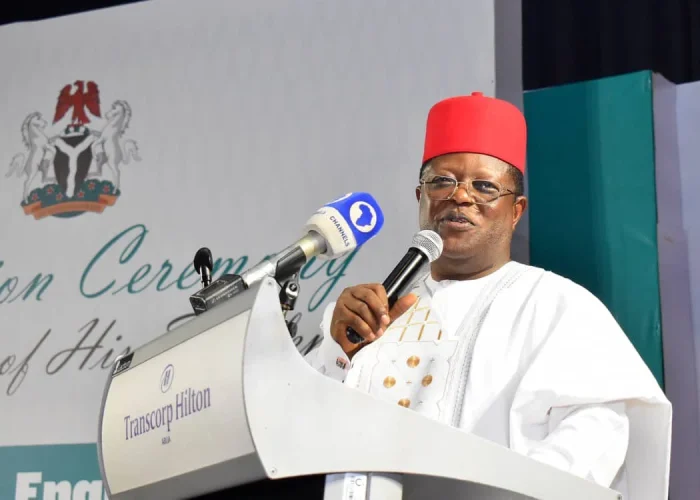Minister of Works David Umahi confirmed that the first 30 kilometres of the Lagos-Calabar highway would be inaugurated in May.
He made this announcement during a stakeholders’ meeting in Lagos, highlighting notable progress despite several initial construction setbacks.
The government rerouted section one of the highway to prevent mass demolitions along the originally gazetted construction corridor.
Although many structures along the corridor were built illegally, the government adopted a humane approach by rerouting construction.
Soil Integrity Challenges Overcome
Umahi disclosed unforeseen challenges arose during construction, especially along a 10-kilometre stretch where soil integrity was compromised.
Years of refuse dumping had weakened the soil, requiring deep excavation and sand filling before construction could safely proceed.
“We excavated up to 10 meters, sand-filled back to ground level, and allowed time for soil settlement,” Umahi explained.
Following successful tests, he confirmed the settlement process achieved 100 percent completion, allowing construction activities to continue seamlessly.
Project Timeline and Key Sections
The minister announced that 20 kilometres from Chennai Zero to Chennai 20 would be completed and commissioned by May.
Additionally, another 10 kilometres from Eleko Junction toward Chennai 37 would be ready for President
Tinubu’s official commissioning.
This progress completes 30 kilometres of section one, leaving 17 kilometres remaining for subsequent construction and final completion.
Addressing Demolition Concerns
Umahi addressed property demolition concerns, confirming only one building remains on the current highway construction path.
Negotiations with the building owner have concluded, with work continuing on both sides of the remaining structure.
“The house currently stands at the road’s center; construction will progress on both sides without disruption,” he added.
Expansion into Key Economic Zones
The minister highlighted integrating the Lekki Free Zone into the project to support economic growth and infrastructure development.
He confirmed construction would commence in the coming weeks, with official flag-off ceremonies planned for the designated locations.
Redesign for Cost Efficiency
Addressing future construction plans, Umahi explained redesign strategies for sections requiring extensive and costly bridge constructions.
Bridges spanning up to three kilometres in states like Ondo, Delta, and Rivers would have significantly increased project costs.
Redesigning the highway route through upland areas eliminates nearly 90 percent of bridges, ensuring substantial cost savings.
“This strategic redesign guarantees higher returns on investment while maintaining essential connectivity across vital economic regions,” Umahi stated.
Economic Growth Under Tinubu’s Leadership
Umahi praised President Tinubu’s leadership, attributing recent economic improvements to effective policy decisions and strategic governance.
He cited stable exchange rates, gross domestic product (GDP) growth, and decreasing fuel prices as key economic indicators.
“The economy is bouncing back; GDP is growing steadily, and fuel prices continue to decline remarkably,” Umahi said.
He urged Nigerians to support government policies, emphasizing national unity as crucial for sustained economic development.




